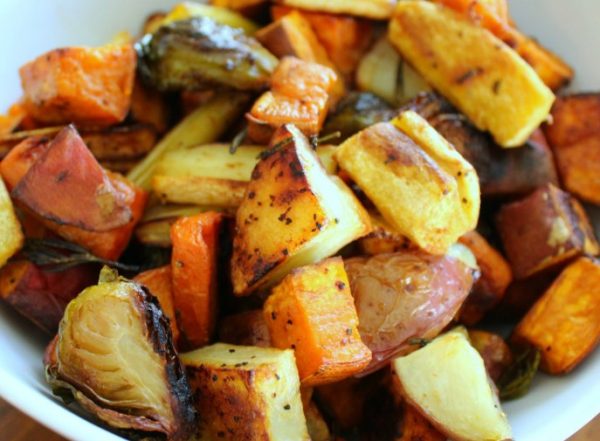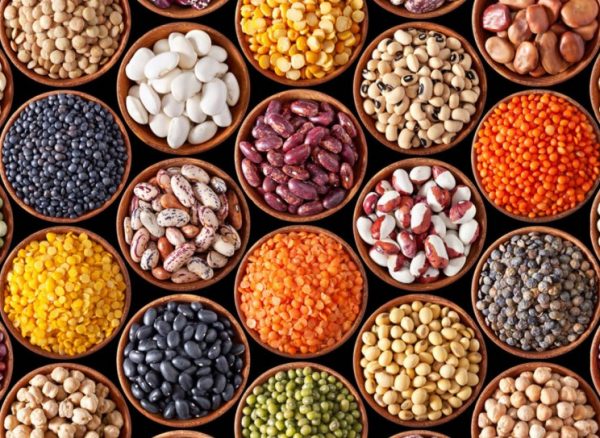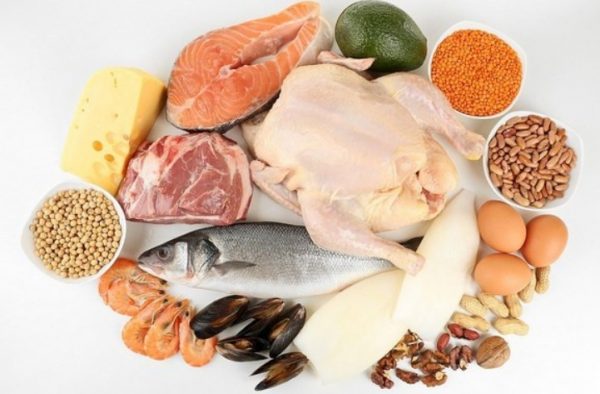Why does the body need carbohydrates?
Carbohydrates are organic substances consisting of hydrogen, carbon and oxygen. A person is able to generate a source of energy on his own, but the main supply of strength comes from eating food.
Cereals contain 85% carbohydrates, sugar – 99%.
Carbohydrates are divided into 2 types:
- simple;
- complex;
The first type is found in sugar, honey, and sweets. Such substances are easily absorbed by the body and enter the bloodstream. Doctors recommend consuming these products in small quantities.

Complex carbohydrates include starch, fiber, dietary fiber, etc. They are absorbed more slowly. They are allowed to be consumed in sufficiently large quantities.
Functions of carbohydrates in the human body:
- provide energy;
- strengthen tissues;
- prevent the growth of bacteria in the stomach;
- break down fats;
- normalize the functioning of the immune system;
- participate in the formation of enzymes and the production of hormones.
What time of day can you actually eat carbs?
Author:
Bondar Yulia
2 minutes
3820
Low-carb diets have been all the rage over the past decades, and for good reason. Eating large amounts of carbohydrates, especially in the form of sugar, white bread, rice or pasta, is extremely harmful to your waistline, blood glucose levels and, by extension, your pancreas.
And this is logical: if you eat food containing a lot of “fast” carbohydrates and little dietary fiber, which could slow down the process of their absorption, the level of glucose in the blood rises quickly. If you don't burn this glucose through exercise, your pancreas will be forced to produce large amounts of insulin, very quickly, to bring your glucose levels back to normal. In this case, all the “extra” sugar will turn into fat, which can lead to major health problems.
It is believed that consuming carbohydrates before bed is much more harmful to the body than the same amount eaten for breakfast. At first glance, this seems natural: during the day, our physical activity will help burn excess carbohydrates without turning them into fat reserves. And when we eat before bed, the body, preparing for sleep, requires much less energy obtained from carbohydrates.
This is a theory. But is this really the case?
Morning and evening carbohydrates
Dr Adam Collins from the University of Surrey conducted a small study. He invited healthy volunteers for an experiment to test how their bodies cope with high-carbon food in the morning and evening. In addition, the researchers wanted to find out whether the body is able to adapt over time to consuming carbohydrates at different times of the day.
All participants were asked to record all the carbohydrates they ate, including fruits, vegetables, pasta, bread, etc. For the first five days, they were asked to eat most of their carbohydrate intake at breakfast. Participants then had five days of normal eating before being asked to eat a low-carb breakfast and a high-carb dinner for another five days. At the same time, scientists constantly monitored the blood glucose levels of the volunteers.
The results of the experiment surprised its authors
When the researchers tested the subjects' blood sugar levels after five days of high-carbohydrate breakfasts, they found that their average blood glucose level was 15.9 units. The authors of the experiment expected approximately the same results. But after five days of low-carb breakfasts and high-carb dinners, the volunteers' average blood glucose levels did not rise as expected, but dropped to 10.4 .
Scientists have concluded that the main role is played not by the time of day at which you consume carbohydrates, but by the duration of the carbohydrate-free period that precedes it. If you've had a long break from your previous carb intake, your body will be more ready to process it. Typically this break is a night during which you sleep and do not consume any food at all. But the study showed that if you take a day off from eating carbohydrates, your body won't notice any difference.
Thus, it does not matter when exactly you consume carbohydrates - for breakfast or dinner. The main thing is not to overload the body with them during each meal. If you overeat carbohydrates in the evening, try not to consume them in large quantities in the morning. And if you didn't eat too many sandwiches for breakfast, don't be afraid to eat pasta before bed, especially if you spent the day actively moving.
What is important to know about carbohydrates to lose weight
The process of losing weight occurs when energy sources do not enter the body. It needs nutrients, which it takes from fat deposits.
Important! Eating excessive amounts of sugary foods increases insulin levels in the blood, which slows down the weight loss process.
Nutritionists strongly recommend avoiding the following foods:
- flour products and potatoes;
- chips, crackers, instant noodles, cereals;
- sweets;
- carbonated drinks, tea with sugar, coffee;
- fruits and berries rich in fructose: bananas, nectarines, plums.
Calculation of the amount of carbohydrates per day

In order to find out the daily norm of energy sources, it is necessary to calculate how many calories a particular person should consume. Based on this figure, you can calculate how much carbohydrates he needs to receive.
Number of calories per gram of each macronutrient:
- Proteins – 30% of calories. 1 gram = 4 kcal.
- Fats – 30% of calories. 1 gram = 9 kcal.
- Carbohydrates – 40% of calories. 1 gram = 4 kcal.
If a person’s norm is 1500 kcal, then the table of proteins, fats and carbohydrates will look like this:
- proteins: (0.3*1500/4) = 113 g;
- fats: (0.3*1500/9) = 50 g;
- carbohydrates: (0.4*1500/4) = 150 g;
It is difficult to adhere to exact numbers, so an error of 5% of the established norm is allowed.
Carbohydrates: daily requirement
The required amount of energy sources depends on a person’s gender, weight and age.
More details about the daily diet can be found in the table:
| Category | Weight | |||
| 40-50 kg | 50-60 kg | 60-70 kg | 70-80 kg | |
| Man gaining weight | 283 g | 294 g | 305 g | 322 g |
| Man losing weight | 159 g | 163 g | 168 g | 173 g |
| Man maintaining body weight | 210 g | 287 g | 303 g | 323 g |
| Woman gaining weight | 203 g | 242 g | 258 g | 271 g |
| Woman losing weight | 118 g | 150 g | 165 g | 153 g |
| Woman maintaining body weight | 145 g | 187 g | 205 g | 217 g |
Energy value of food
The energy released is measured in kilojoules and is called calories. It is necessary to consume the daily norm of energy value.
Otherwise, the person loses or gains weight.
- Proteins: 1 gram = 16.7 kJ.
- Fat: 1 gram = 37.7 kJ.
- Carbohydrates: 1 gram = 16.7 kJ.
Based on these data, you can calculate the energy value of any product. Using wheat bread (second grade) as an example, let’s find the number of calories in 100 g.
It contains 7.1 g of protein, 1.1 g of fat and 46.4 g of carbohydrates. The energy value will be equal to: 16.7*7.1+ 37.7*1.1+46.4*16.7=934 kJ (234 kcal). The calorie content is written on packages of goods, but with fruits, vegetables and flour products you will have to calculate it yourself.
Daily calorie content is determined by the sum of the energy value of food eaten per day.
Limiting the amount of carbohydrates is the key to losing weight
As a rule, the fewer carbohydrates a person consumes, the faster they lose weight. But we are talking here more about rapid weight loss. And the situation must be considered in its entirety in order to use this method constantly, and not for a short period of time. And here it is necessary to divide carbohydrates into “healthy” and “harmful”.
Carbohydrates that are “useful” and necessary for a person to stay in shape include vegetables and whole grain cereals. They help improve digestion, and therefore help with weight loss.

How to eat less sugar and what to replace sweets with?
For men, the carbohydrate norm varies from 165 to 185 g per day, depending on weight, if we are talking about losing weight. Accordingly, more weight requires more carbohydrates. To maintain a figure, these standards are already at the level of 250 g. For women who are losing weight, the standards are around 150 g, and for those who are already in shape and do not want to lose it - closer to 200 g.

Photo: istockphoto.com
What carbohydrates can you eat while losing weight?
When losing weight, it is necessary to exclude simple carbohydrates and consume complex ones. The latter are capable of dissolving into elemental sugar for up to several hours.
The breakdown of these organic substances occurs without increasing insulin in the blood, thanks to which a person does not feel hungry. The body spends a large amount of energy processing such products, burning extra pounds.

When losing weight, it is necessary to exclude simple carbohydrates and consume complex ones.
The diet must include food containing glycogen, starch, fiber, insulin and pectin. These substances are enzymes that can quickly break down glucose. Their responsibilities also include removing toxins from the stomach and intestines.
Products necessary for a diet containing “good” carbohydrates:
- whole grain bread or bran;
- pasta;
- cereal porridges;
- vegetables (carrots, beets, potatoes, onions);
- beans, soybeans, peas;
You can’t categorically refuse sweets. It is recommended to eat only real dark chocolate.
Fibrous carbohydrates
Fibrous carbohydrates must be eaten during a diet, as they are low in calories, but quickly fill a person. This type also burns fat well.
They are most often found in green vegetables:
- cucumbers;
- broccoli;
- asparagus;
- mushrooms;
- tomatoes;
- pasta;
- Red beans.
To quickly lose weight, girls use lean proteins and fibrous carbohydrates in their diet.
This combination gives quick weight loss, but if a person needs to gain muscle mass, then he should not eat food with these organic substances.
Sweet carbohydrates
This is the name given to simple carbohydrates that have a sweet taste.
Excessive consumption of products containing such an organic compound is harmful to human health. They are quickly broken down in the blood, producing insulin, which is then converted into fat cells.
When dieting, you should avoid foods containing glucose, fructose, and sucrose:
- confectionery;
- sweet carbonated drinks and juices;
- semolina and rice porridges.
Attention! After drinking a small can of Coca-Cola, a person consumes 9 tablespoons of sugar, a cup of latte – 7 tablespoons.
Starchy carbohydrates

Starchy carbohydrates help you not feel hungry for a long time. With limited consumption of starchy foods, a person will not gain weight.
These include:
- oatmeal, barley;
- rice, buckwheat;
- legumes (peas, beans).
Rules for consuming healthy carbohydrates for weight loss
Healthy carbohydrates are complex organic substances; they are the ones that need to be included in your diet when losing weight.
You need to know a number of rules, without which the desired result cannot be achieved:
- Simple carbohydrates should make up only 15% of the components consumed. The remaining 85% is starchy.
- It is necessary to eat vegetables and fruits rich in fiber.
- To lose weight, it is important to consume proteins together with carbohydrates, as they will help gain lean body mass.
- You should not eat a lot of food at one time. It is better to break your meals into several parts and eat in small portions.
- Confectionery products are best consumed in the morning, before lunch. In the evening, sucrose is poorly absorbed by the body, which causes unnecessary fat mass to appear.
When creating any diet, it is necessary to include a combined set of products. You can’t eat just one thing, like rice. When dieting, it is necessary to include vegetables and grains in the diet.
Calorie game
Now that we roughly understand how much protein, fat and carbohydrates we need per day and why, we can “play” with the total number of calories. In order to lose weight and stabilize your shape, the daily calorie intake must be reduced by 15-20%. But to gain muscle mass, on the contrary, increase by the same 20%.

BJU “for dummies”: why count calories
Of course, you always need to make adjustments for a person’s age, his daily physical activity, and even bone size in men, for example. Men with large bones should not indulge in carbohydrates. But this will not particularly affect women with fast metabolism. There is no universal recipe, but having such knowledge will help you choose your path to form a healthy body.
How many carbohydrates do you need per day when losing weight?
Depending on how long a person wants to lose excess weight, nutritionists draw up the daily intake of foods containing carbohydrates:
- 100-150 g. Average value, which is suitable for maintaining mass. Further reduction in the norm will lead to weight loss.
- 50-100 g. By taking this amount of carbohydrates, a person will begin to lose kilos without feeling it. It is only important to maintain a diet and eat food that does not leave you feeling hungry for a long time.
- 20-50 g. This amount will lead to weight loss in a short time.
Important! You cannot start losing weight without the help of a nutritionist, as a lack of substances can lead to serious disorders in the body. A famous example of the consequences of dieting is anorexia. In most cases, if this disease is not overcome, death occurs.
The type of life a person leads plays a big role. During physical activity, nutritionists believe that it is necessary to consume 4 g of carbohydrates per kilogram of a person’s weight.
It is important to exercise, otherwise the weight will not come off. In the absence of physical activity, the norm drops by half - to 2 g per kilogram of body weight.
Without carbohydrates there is no energy
The norms for carbohydrate intake for any person should be approximately half of the total calories. Carbohydrates are the main resource for replenishing energy. Accordingly, the remaining 50% is distributed between proteins and fats.
Athletes sometimes require more protein and carbohydrates than a person whose physical activity is not as high. We are talking about approximately 1.5 - 2.5 g per kilogram of weight. Athletes also typically need more protein, especially when it comes to lifting weights and gaining muscle mass. Fats won't hurt here either.
But for sedentary office workers or those who work from home, excess fat leads to weight gain. And primarily in the abdominal area.

Photo: istockphoto.com
Consequences of a lack of carbohydrates
With a lack of carbohydrates, the body begins to signal a malnutrition. First of all, the body begins to take energy from proteins. Because of this, they cannot perform their functions: synthesize new cells and tissues, produce antibodies and hormones.
Many diets are based on eliminating foods rich in carbohydrates. However, their absence in the body can disrupt the process of burning fat deposits, and the person, on the contrary, will gain weight.
Due to the lack of these components, a person experiences nausea, accompanied by vomiting, headaches, lethargy and fatigue.
Calculation of calorie content and ratio of BZHU
To maintain or lose weight, it is important to know how many calories you need to consume daily.
You can use the following simple algorithm:
- Multiply the mass of a person by 10.
- Human height multiplied by 6.25.
- Add the results of steps 1 and 2.
- Number of years multiplied by 4.9.
- Subtract the result of the calculations in step 4 from the number obtained in the calculation of step 3.
- For men, add the number 5 to the result of step 5, for women, subtract 160.
- The resulting number in step 6 is multiplied by the physical load coefficient:
- In the absence of physical activity, it is equal to 1.2.
- If a person walks a lot, sometimes goes to the pool or does exercises at home, then the coefficient is 1.4.
- If you exercise several times a week – 1.6.
- If a person trains daily and is highly active, then the result obtained in step 6 is multiplied by 1.7.
Protein products
Proteins serve a person to convert fats into energy.

Protein products
When losing weight, it is important to eat foods containing proteins (meat, fish). The components included in these products help to gain muscle mass and also cleanse the body of waste and toxins.
Benefits of eating protein:
- improvement of heart function;
- decreased feeling of hunger;
- removal of excess fluid, which can be deposited in the form of fat reserves;
- improvement of metabolism.
Allowed foods include: chicken, seafood and low-fat dairy products. Among vegetables and fruits, eggplants, avocados, and apples are rich in proteins. A protein diet helps you quickly get rid of extra pounds, but other organic components cannot be completely eliminated.
Fats: get rid of them or leave them
It is not recommended to completely give up fat during a diet, as the person will have difficulty thinking and feel tired.
When dieting, it is recommended to consume foods containing omega-3 fatty acids: salmon, tuna, cabbage, walnuts, parsley.
They perform the following functions:
- improve human memory;
- reduce the likelihood of developing cancer;
- fight fatigue;
- reduce the load on the heart and joints;
- increase skin protection, reducing the load on the skeleton.
Don't forget about the squirrels
Athletes consume approximately 1.3-1.8 g of protein per day per 1 kg of body weight. There are many theories that protein is the main reason for muscle growth in people with high levels of physical activity. This is a correct judgment, but without the correct use of carbohydrates and amino acids, muscle gain will not be as effective.

Dessert for muscles: 5 sweet protein recipes that won’t harm your figure
We have good news for protein lovers. Unlike fats and carbohydrates, their excessive consumption does not lead to the deposition of fat reserves. More precisely, it leads to a much lesser extent - so that it is hardly noticeable. For men, the norm may be 155-185 g of protein per day, depending on weight. For women – 120-170 g per day. What's interesting here is that you need more protein to lose weight than just to maintain weight.

Photo: istockphoto.com











